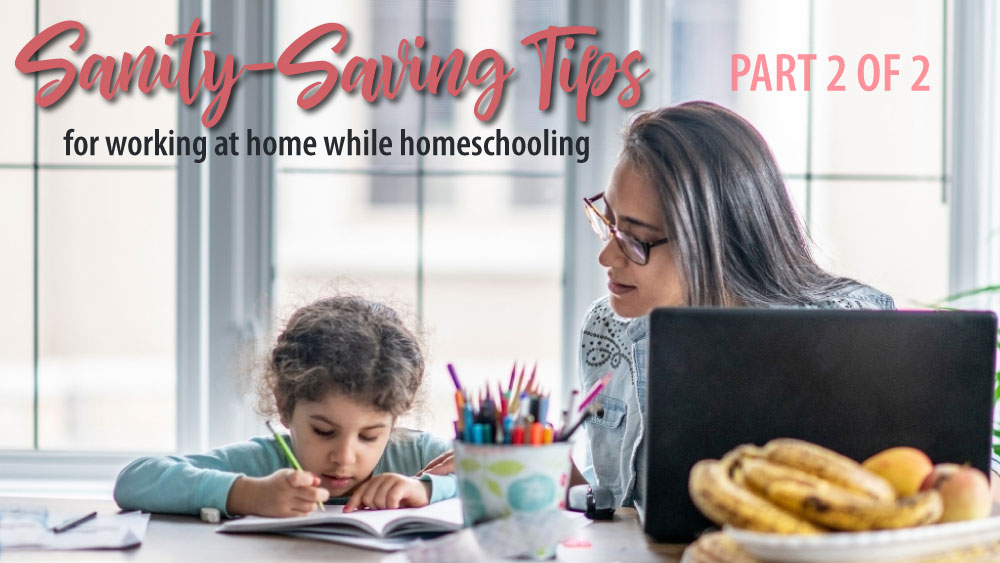Congratulations! If you are a working parent and you’ve just completed your first year homeschooling, you may have figured out a balance between your homeschool and work responsibilities.
Now, the question is:
How will you get your work done this summer?
You have work to do, and the kids have nothing but free time! Are you already sweating how you are going to get your tasks completed this summer? Let’s talk about three keys to keeping the peace and getting your work done this summer.
Homeschooling is on the rise among, especially among working parents. They are discovering the flexibility homeschooling offers their students. Families can personalize the curriculum for each child and fine tune each subject taught. Working parents are choosing to customize learning tools for their kids and to create an experience that helps their kids learn and be successful at home. It is paying off with more family time, better learning, and stronger families.
Achieving all of this while working is no small task. Navigating schedules and responsibilities can be a challenge during the school year, but the stability of a school schedule helps to keep the whole family moving in the same direction. This is why parents can find their first summer break while homeschooling a challenge.
Breaking the normal school routine can send the kids into disorder. Even when everyone is longing for a break from the work of school, there is comfort in knowing what to expect each day while school is in session.
What is going to happen
this summer?
Are you worried about how you are going to have a Zoom meeting with the kids bouncing off the walls or that you are going to be conducting your calls from the public pool?
Let’s talk about three things that are going to help you navigate your first summer at home.

FIRST:
Create and Communicate
Clear Expectations
What are you working hours? Before you set these in stone, can you negotiate some flexibility over the summer? Some offices move to a four-day week in the slower season. Could you break your working hours into two shorter sessions? Older children tend to stay up late and sleep in later in summer. This can work to your advantage by giving you early office hours with fewer interruptions.
Once you establish your office hours, tell everyone. Make these hours clear for your spouse, your children, your mother, and the neighbor kids. Post them on the fridge. It is easier to keep your word if it is already clear to the whole family from the beginning.
Don’t Put off Work
That Can Be Done Now

SECOND:
Make Your Work Time Productive
Protect your working hours and make them be your most productive time of the day. If you choose to work in the early morning, purchase breakfast items that the kids can make and eat with little to no assistance from you. After a few productive hours, break for lunch and have a family time to connect and plan your evening.
When you are working, clearly communicate the times when you can and cannot be interrupted. In our home, I close the door when I am on a call or recording podcast interviews or speaking sessions. I am always sure to open the door when I am finished. By practicing this habit, my kids trust that I will open the door when I am available. Because they trust me, they are willing to wait for a break in my tasks and have learned to respect the times when I need to concentrate.
Don’t Allow Your Day to
Unfold Without Intention
Plan your workday in advance. Prioritize tasks and do the top items early in the workday. Knock these out first thing. Identify any distractions and remove them. (You have to keep the kids! But go ahead and set your computer to focus time.) I block access to distractions on my computer and use timers on my phone to block social media and other time wasters during my work hours. Plan your workday in advance.
By doing these small steps, I promote productive practices. When interruptions come, and they will, I have the ability to remain flexible. When deadlines pile up or schedule upsets happen, I communicate these with my family.
Don’t forget to ask for help. That might mean asking your spouse to pick up pizza for dinner or to take over a few of your regular errands or summer sport drop-offs. It took me a lot longer than it should have to allow my husband to help me with tasks that I felt I should do. When I shared my needs, he was happy to help. Now, it is natural for me to ask for help in other areas. Sharing the load has helped us depend on each other more deeply, instead of feeling overwhelmed and divided.
Little changes are easier to navigate if you are doing a good job of prioritizing the big tasks. After sharing household tasks, look at your workload. Shift your lower priority work to the end of the day. Less productive tasks, like checking and returning emails, can be done after major projects are completed.

THIRD:
Maintain the Reading Habit
Make reading a priority for your kids this summer. It can be easier if you join a Summer Reading Program as a family. You can find one at your local library or a large bookstore. Establish a “quiet reading hour” for everyone in your house. You will gain an hour of work time, especially if you schedule this when your younger children are napping. The quiet hour also gives your kids a sense of regularity in their summer schedule.
By maintaining the reading habit, your kids will come out of this summer without the typical 30% loss of skills that school children experience because of summer slide.
At our house, we like to gather a basket of books on a common subject and have informal unit studies in the summer. This is a great way to dig deeper in a topic the kids showed interest in during the school year or to introduce a topic you will be learning about in the coming school year.
How will you get your work done this summer? What are some of the best tips you have employed to help your family life thrive while you are working from home? Would you leave a comment and share with other parents that are looking for ideas?
MORE FROM OUR WEBSITE:



